Chinese New Year – Few lines, Short Essay and Full Essay
Essays , Festivals 0
Last Updated on January 25, 2020

Few lines about Chinese New Year
- Chinese new year is also known as Lunar new year
- It is a Chinese festival celebrating the beginning of a new year of the Chinese calendar.
- In mainland china, the day marks the onset of spring and is referred as the Spring Festival.
- In 2020, the Chinese New Year is celebrated on 25th January and it’s a public holiday.
- This Chinese year is called the Year of the Rat.
Brief essay on Chinese New Year
Chinese New Year is a well-known Chinese festival that celebrates the beginning of a new year of the Chinese calendar. It is also known as lunar New Year or the Spring Festival as it marks the onset of spring. The first day of Chinese New Year begins on the new moon day that happens between 21 January and 20 February. In 2020 the Chinese New Year is celebrated on 25th January commencing the Year of the Rat. Chinese New Year is an important holiday in China and the festival is also celebrated worldwide in regions with significant Chinese populations.
Long Essay on Chinese New Year
Chinese New Year marks the beginning of a new year in the Chinese calendar. It is also termed as “Lunar New Year”, “Chinese New Year Festival”, and “Spring Festival”. Generally, the Chinese New Year falls on different dates every year in the Gregorian calendar. It is calculated based on the first new moon day that falls between 21th of January and 20th of February.
Chinese New Year celebrations starting from the New Year eve and ends with the Lantern festival that is held on the 15th day of the year. Chinese New Year is observed as a public holiday in china and in several countries with sizable Chinese and Korean population. It is the longest holidays in china. The holidays mark the end of the winter’s coldest days and people welcome the spring, praying to Gods for the upcoming planting and harvest season.
Different regional customs and traditions accompany the festival. Eating dumplings, Yule Log cake, tang yuan or ‘soup balls’, and red envelopes with ‘lucky’ money are part of customary celebration. According to some Myth, the Chinese New Year festival celebrates the death of a monster called Nian, which was killed by a brave boy with fire crackers on the New Year’s Eve. And that’s why firecrackers is considered the crucial part of the Spring Festival as it is believed to scare off monsters and bad luck.
This year, 2020, Chinese New Year falls on 25th of January is called the year of the Rat.
Related Worksheets and Exercises
- St Patrick’s Day Essay
- Favorite Festival – Diwali
- What is Black Friday? Why we call it Black Friday?
- Rakshabandhan 2017
- Thiruvalluvar Day
- Pongal Festival
- Happy New Year
- Guru Nanak Jayanthi
- Rakshabandhan
Leave a Reply Cancel reply
Your email address will not be published. Required fields are marked *

- Immersion Program
- Learn Chinese Online
- Study Abroad in China
- Custom Travel Programs
- Teach in China
- What is CLI?
- Testimonials
- The CLI Center
- Photo Gallery
A Brief Guide to the Chinese New Year (春节 Chūnjié)
Learn Chinese in China or on Zoom and gain fluency in Chinese!
Join CLI and learn Chinese with your personal team of Mandarin teachers online or in person at the CLI Center in Guilin , China.
Perhaps the most important of all Chinese holidays , the Chinese New Year is celebrated worldwide each January or February in places like Hong Kong, Taiwan, Singapore, Malaysia, Thailand, Cambodia, the Philippines, and Mainland China.
Also called the Spring Festival (春节 Chūnjié), the Chinese New Year celebrates the beginning of the Chinese year based on the traditional Chinese lunisolar calendar and officially ends 14 days later with the Lantern Festival .
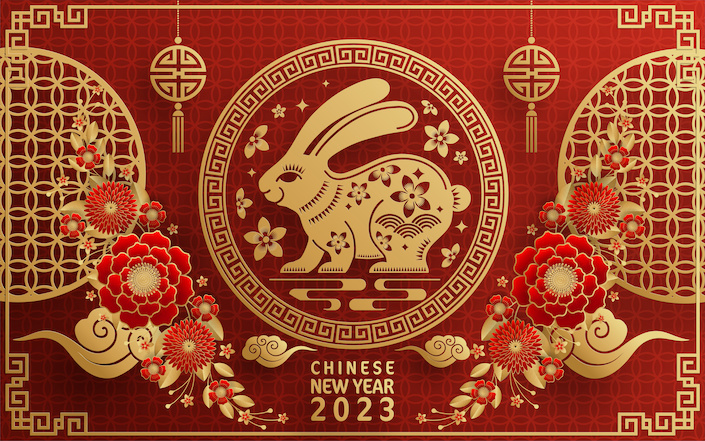
Table of Contents
Learn Chinese with CLI
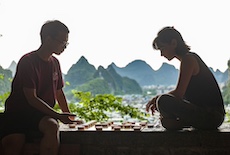
How is Chinese New Year celebrated?
Spring Festival is a time for families to come together, exchange money-filled red envelopes (红包, hóngbāo) , and enjoy delicious Chinese food.
The Chinese New Year is a 15-day holiday and includes a variety of festivities depending on the region and its local traditions and customs. However, certain common customs are shared regardless of region.
For example, it is common practice to decorate one’s home with Chinese lanterns . In many homes, you will find auspicious Chinese characters and couplets on red paper stuck on doors. Red is an auspicious color as it scares away the Nian monster . Wearing new clothes is also a common tradition to ward off bad luck—a new year is a time for newness after all!
View this post on Instagram A post shared by Chinese Language Institute (@studycli)
The Chinese New Year is an important time to 拜年 (bàinián, to pay a new year call), so it is common practice to visit relatives and exchange auspicious greetings and Chinese gifts , including the ever-popular lucky red envelopes filled with Chinese currency . Devoted Buddhist and Daoist practitioners also often visit local temples to welcome the new year.
The holiday has even had an influence on the traditional festivals of other cultures with whom the Chinese have historically interacted, including the Koreans, Vietnamese, Mongolians, and Japanese.
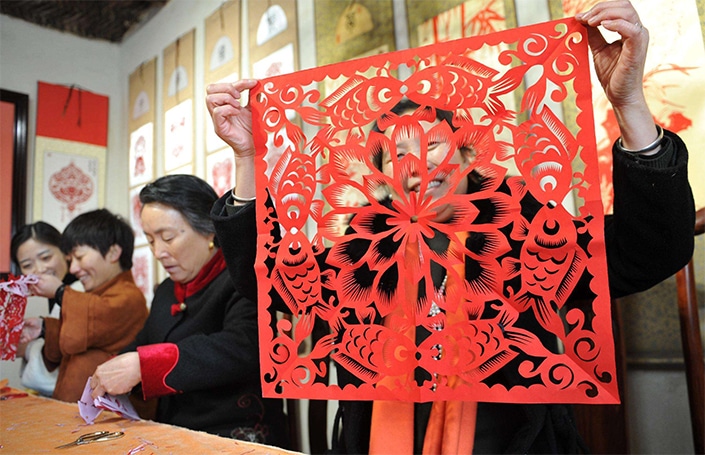
What foods are eaten during Chinese New Year?
Family is of central importance in traditional Chinese culture, and Spring Festival is generally a very family-oriented holiday.
The New Year’s Eve dinner (年夜饭 niányèfàn) kick starts the tradition of family reunions. In fact, the Chinese Spring Festival also marks the world’s largest human migration, as overseas Chinese and Chinese migrant laborers return home to celebrate the advent of the new year alongside their families.
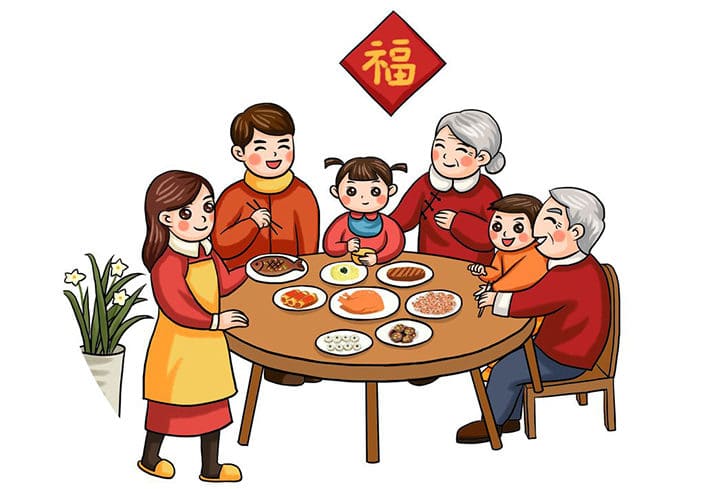
Though traditions can vary between northern and southern China, here are a few examples of common “auspicious foods” presented at reunion dinners:
1. Steamed Fish | 蒸鱼 | zhēng yú
As you may already know, the Chinese language includes many homophones (同音词 tóngyīncí), which results in many characters and words having the same pronunciation as one another.
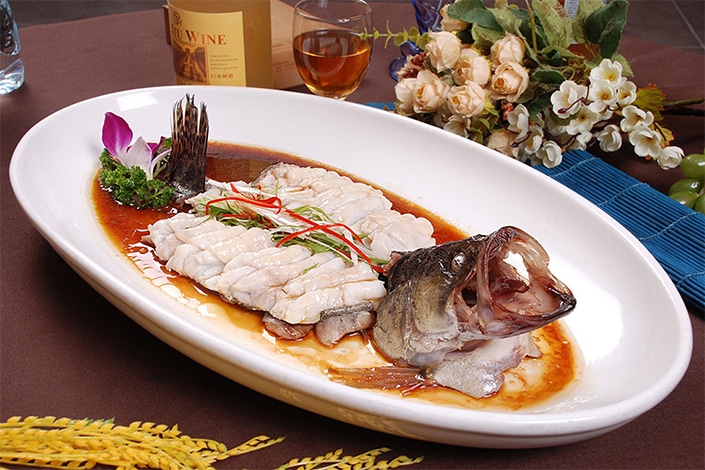
In this instance, “fish” (鱼 yú) has the same pronunciation as “surplus” (余 yú). There is also a typical New Year greeting, 年年有余 (niánnián yǒuyú), which translates to “may you have a surplus (of blessings) every year”. Therefore, eating fish symbolizes an increase in prosperity.
2. New Year Cake | 年糕 | niángāo
Sticky rice cakes symbolize a prosperous year to come, as “cake” (糕 gāo) has the same pronunciation as “high/lofty” (高 gāo). This coincides with the greeting 年年高升 (niánniángāoshēng; “advance year after year”). Rice cakes are a must during Chinese New Year festivities!
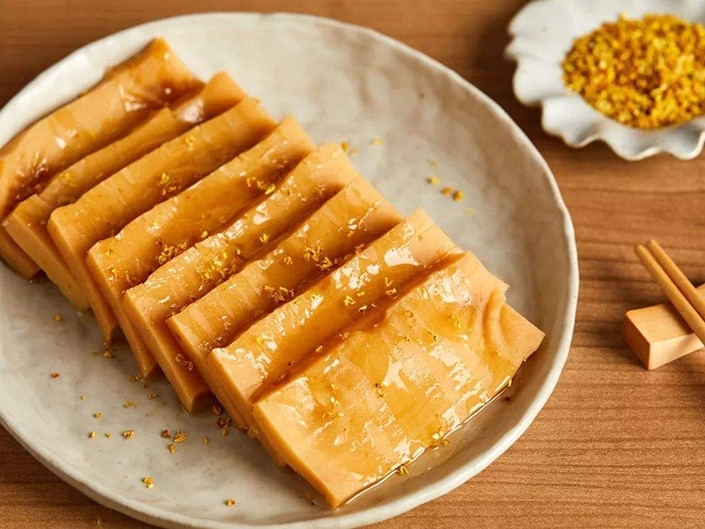
3. Spring Rolls | 春卷 | chūnjuǎn
How can you start spring without spring rolls? This delicacy was originally a seasonal food that was consumed only during the spring. Eating spring rolls is a way to welcome the arrival of spring, and their golden color also symbolizes wealth and prosperity.
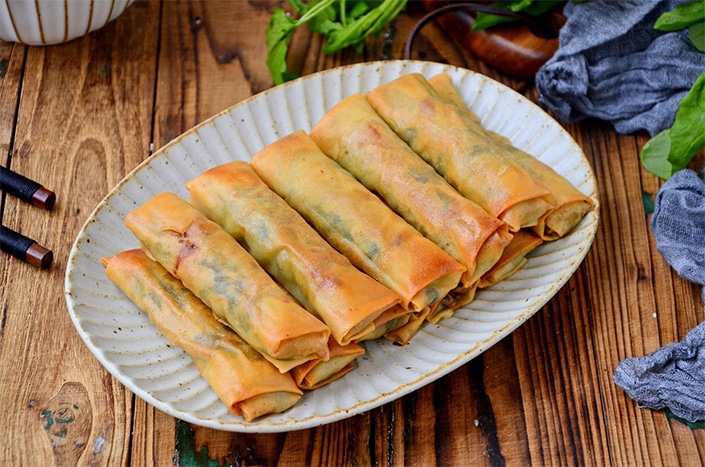
4. Fruits | 水果 | shuǐguǒ
Fruits are commonly enjoyed as desserts and snacks during Spring Festival celebrations. They symbolize life and new beginnings and are also a common new year gift.
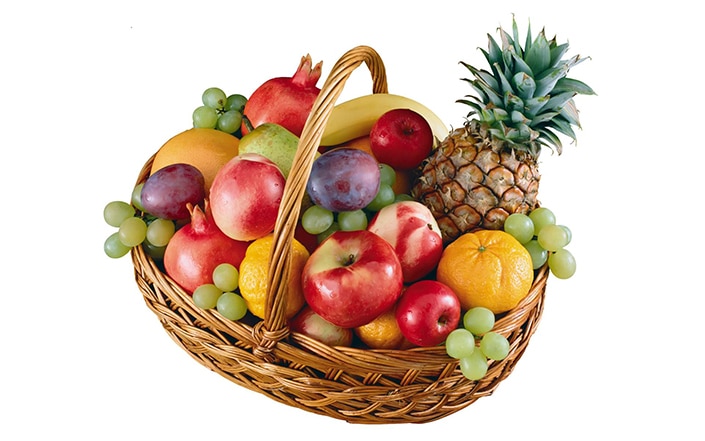
5. Dumplings | 饺子 | jiǎozi
Due to their resemblance to imperial coins (元宝 yuánbǎo), dumplings are representative of wealth and fortune.
6. “Longevity Noodles” | 长寿面 | chángshòumiàn
“Longevity noodles” are a kind of flat Cantonese egg noodles which are usually consumed during special occasions (such as the Chinese New Year and birthdays).
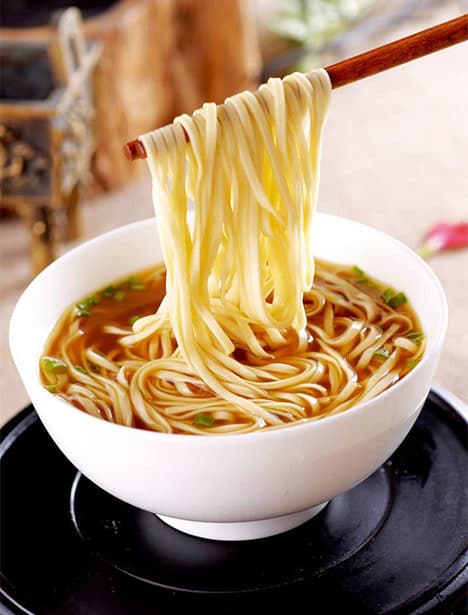
As their name indicates, their long strings represent longevity and living to a ripe old age. The trick is to eat them in a single mouthful and not cut the noodles short!
7. Tangyuan | 汤圆 | tāngyuán
The fifteenth and final day of the new year holiday is celebrated by the Lantern Festival (元宵节 Yuánxiāojié). During this time, it is common to eat a Chinese dessert called tāngyuán (汤圆), which consists of sweet glutinous rice balls filled with a variety of fillings such as sesame, peanut, and red bean paste. Their round shapes represent togetherness and reunion.
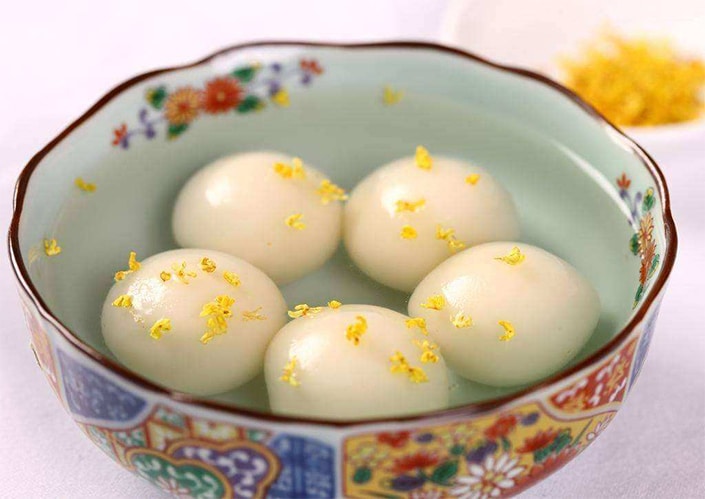
How to Say Happy New Year in Chinese
Would you like to wish a friend, colleague, or loved one Happy New Year in Chinese? Read on to learn this festive phrase and more!
Cultural note: In China, people often hold a fist salute or 抱拳礼 (bàoquánlǐ) when saying the below greetings. Remember that this method of greeting is mainly used during formal occasions, so we suggest to avoid using it during informal encounters!
1. 新年快乐 (Xīnnián Kuàilè) - Happy New Year!
Saying “Xīnnián Kuàilè” is the simplest and most straightforward way to wish your Chinese friends, family and colleagues a happy new year. Want to know how to pronounce it? Just watch the following video and repeat!
2. 恭喜发财 (gōngxǐfācái) - May you have a prosperous year!
In addition to 新年快乐 (Xīnnián Kuàilè), this is probably the most popular saying you'll hear around the Chinese New Year. It has been the center of many 贺年歌曲 (hènián gēqǔ, Chinese New Year songs) and literally means “congratulations, make a fortune!”
Learn to sing along to the famous Chinese New Year song “恭喜” (gōngxǐ) in the following video.
兔年大吉 (tùnián dàjí) - Happy Year of the Rabbit (2023)
大吉 (dàjí) is a noun meaning very auspicious or lucky. You can put any given year's zodiac animal year before 大吉 and use it as a general new year greeting. You can also simply say 大吉大利 (dàjídàlì), which means “good luck and great prosperity.”
To learn how to say other year-specific Spring Festival greetings, see the Spring Festival Chinese Vocabulary List toward the bottom of this article.
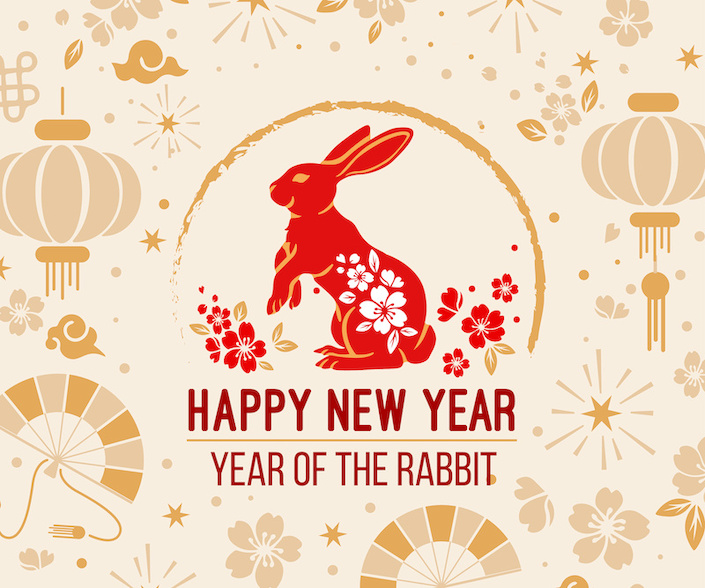
4. 岁岁平安 (suìsuì píng'ān) - May you have peace year after year
A fun things aspect of Chinese is wordplay based on 同音词 (tóngyīncí, homophones). A great example of this is 岁岁平安. Breaking things during the Chinese new year is a taboo in China as it is believed to bring bad luck resulting in money loss and a family split in the future.
If something does break, you can say “碎碎平安” (suìsuìpíngān) which sounds exactly the same as “岁岁平安” (suìsuìpíngān) . “碎” means to break, whereas “岁” means age or year and is the character used in 岁岁平安. This is a very clever way to negate all that bad luck!
5. 万事如意 (wànshìrúyì) - May all your hopes be fulfilled
万 literally means “ten thousand” or “a great number.” When you say 万事如意 to your Chinese friends, you are literally wishing that all matters (万事, ten thousand matters/affairs) be according to his/her wishes (如意)。
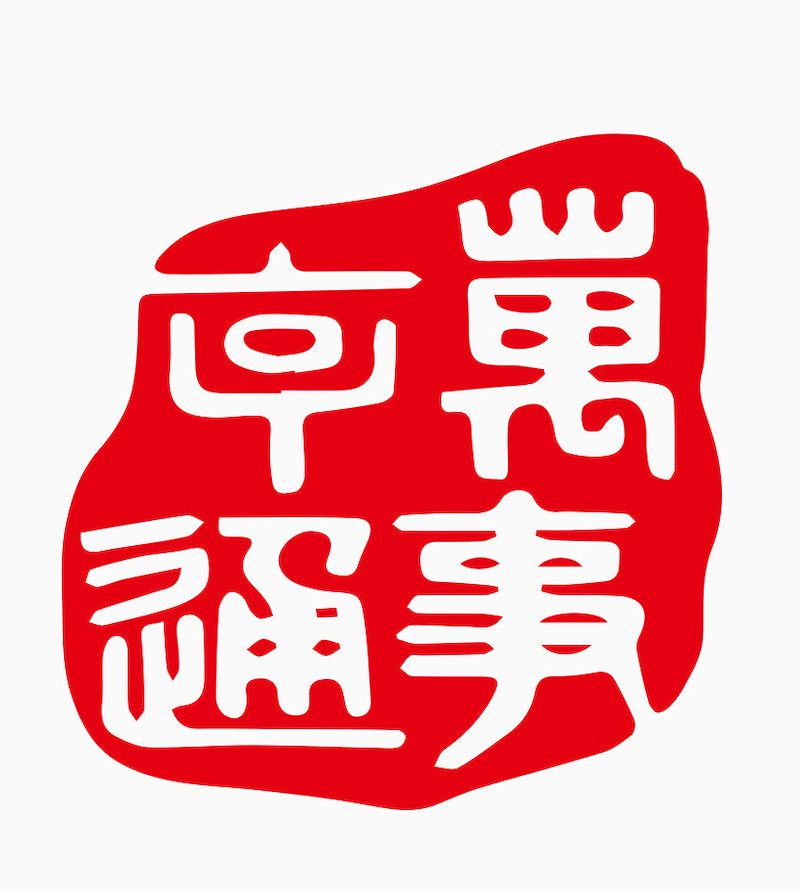
What are some taboos during Spring Festival?
All auspicious things aside, there are certain taboos that must be avoided during Chinese New Year:
1. No cleaning!
Any type of “spring cleaning” must take place before the new year and never during the actual holiday. This allows the cleaned space to be filled with the new blessings and fortunes of the new year. Cleaning during the holiday consequently means that you are getting rid of these new fortunes!
2. No wearing black or white!
In Chinese color symbolism, black signifies evil and white is the color of death and used for funerals. Instead, auspicious colors such as red and gold are often worn during the new year.
3. No cutting hair!
发 fā (hair) is also the character and sound for 发财 fā cái (to get rich), so cutting hair signifies a loss of fortune.
4. No breaking things!
碎 suì means to break, whereas 岁 suì means age or year. If something does break, you can say “碎碎平安” (suì suì píng ān) which sounds exactly the same as “岁岁平安” (“may you have peace year after year”).
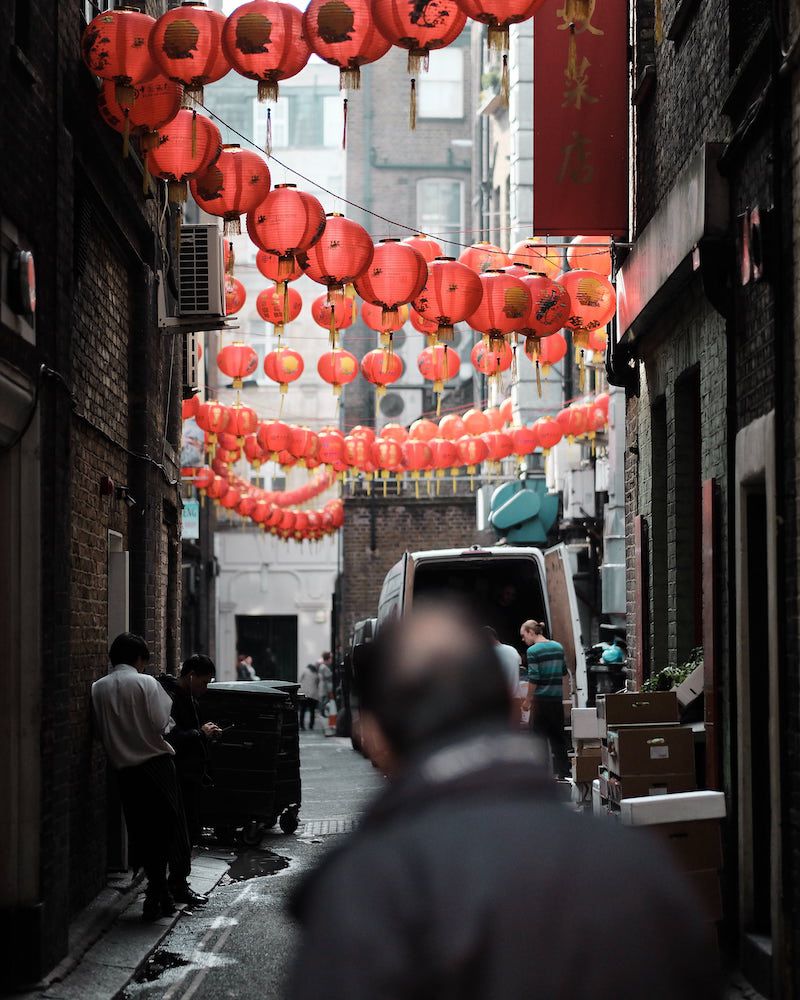
Why is it called the “Lunar” New Year?
The term “lunar” is an English adaptation, mainly because the holiday starts with the new moon, ends with the full moon 14 days later, and is thus based on the Chinese lunisolar calendar . The name of the holiday in Chinese, 春节 Chūnjié, literally translates to “Spring Festival”.

Chinese Zodiac Animal Signs
The Chinese New Year is also a time when the annual zodiac sign changes, meaning that each year is assigned to a specific zodiac animal. Zodiac signs play an integral role in Chinese culture. It is said that your luck regarding financial situations, health and relationships for each year can be calculated based on your zodiac sign.
To ask your Chinese friends and colleagues what their zodiac animal is, just say "你属什么? (nǐ shǔ shénme?)". 属 shǔ can mean “to belong to” or “to be born in the year of". In China, it is common to be asked how old you are or what your 生肖 (shēngxiào, Chinese zodiac sign) is.
In response, you can say: 我属 (wǒ shǔ) + insert animal. For example: “我属牛” (Wǒ shǔ niú, I was born in the Year of the Ox ). Consult CLI's article on the 12 Chinese Zodiac Animals for an in-depth look at this cultural phenomena and to find out what your own zodiac sign is!
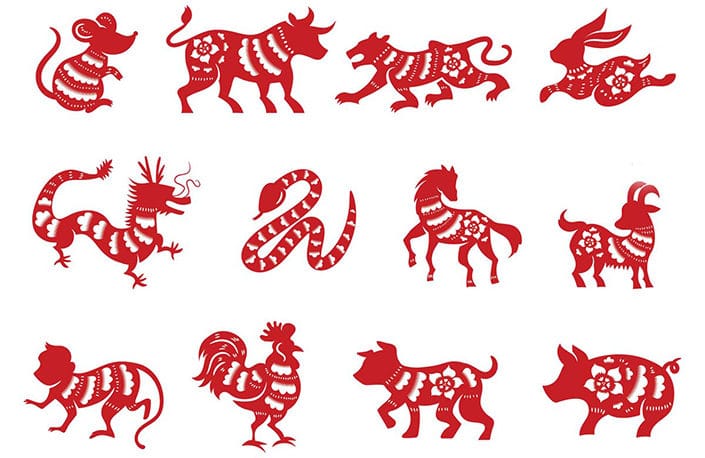
The Chinese New Year Through a Local's Eyes
In our Spring Festival video, we invite you to peer into the life of a Guilin resident who walked the same arduous path traveled by so many in China from poverty to prosperity. Join Dayong, a CLI team member since 2009, as he converses with Uncle Ye (叶叔叔, Yè Shūshu) about how his quality of life has changed for the better over the decades.
While watching the video, follow along in this downloadable Chinese-English transcript for the Chinese characters, Chinese pinyin , and English translation.
Chinese Vocabulary for the Spring Festival
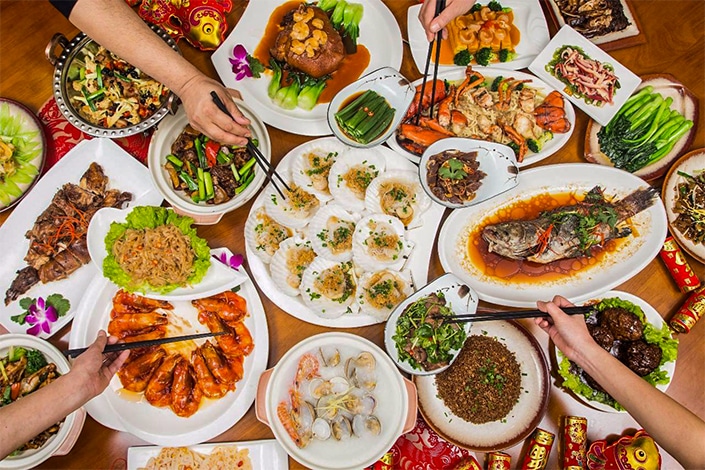
Join a Spring Festival Celebration and Practice Your Chinese
We hope this article helped you learn more about the Chinese New Year! It is truly a fun and festive holiday that is celebrated all across the world. Spring Festival is a time for family reunions, showing appreciation for one’s friends, and delicious feasts.
If you are in China during Spring Festival, we hope you'll get to experience this important holiday for yourself by participating in some Chinese New Year activities with friends or colleagues. Keep in mind that many people will be traveling back and forth during this period as part of the famous Spring Festival travel rush (春运 chūnyùn). If you do plan to go anywhere during this period, especially by train , make sure to buy your tickets far in advance.
If you aren't in China, we encourage you to seek out your local Chinese community, attend holiday events, and even volunteer to help prepare for the Chinese New Year festivities. This is a great way to learn more about Chinese culture and to immerse yourself in the Chinese language .
And now that you know some Chinese New Year greetings, it is time to put them to use! On behalf of the CLI team, we wish you a wonderful Chinese New Year and welcome you to learn Chinese in China . 祝大新年快乐,身体健康,万事如意 !

Free 30-minute Trial Lesson
Continue exploring.
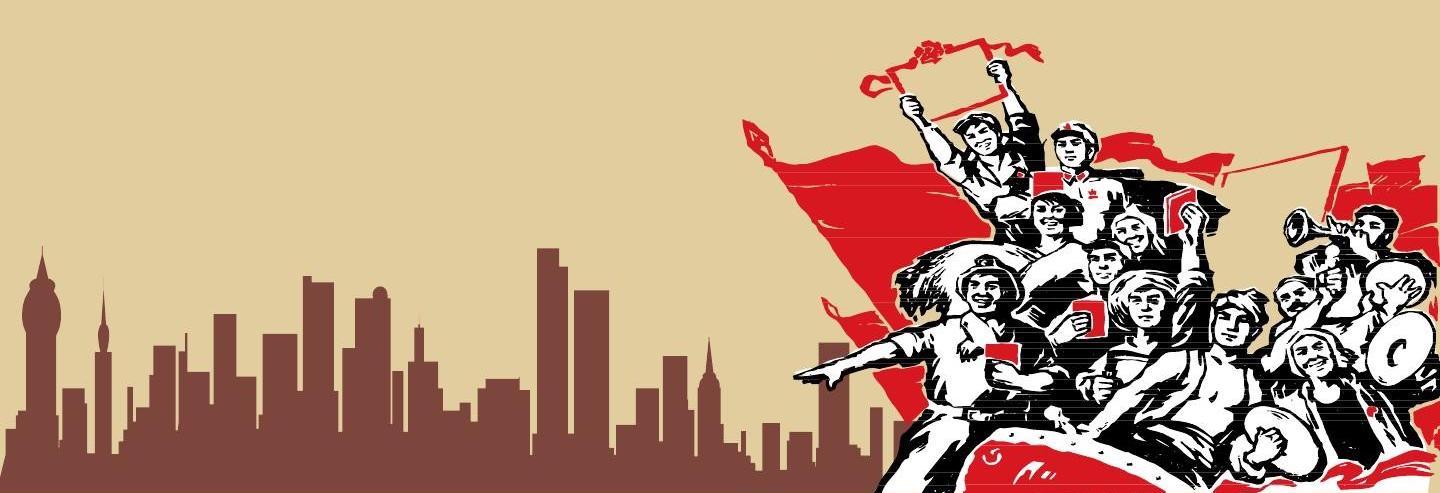
- Chinese Holidays
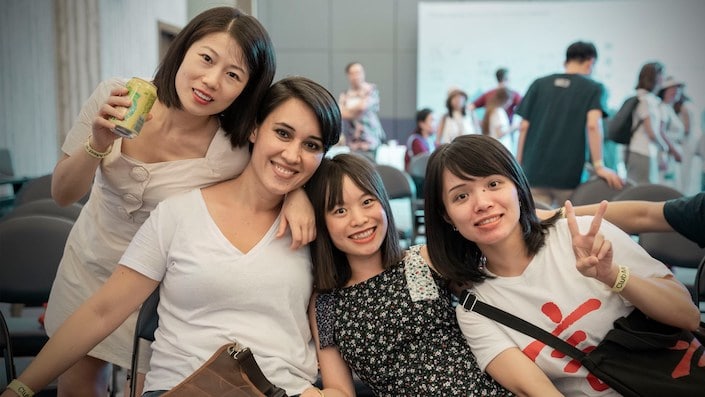
Copyright 2024 | Terms & Conditions | FAQ | Learn Chinese in China
- HISTORY & CULTURE
Why Lunar New Year prompts the world’s largest annual migration
Observed by billions of people, the festival also known as Chinese New Year or Spring Festival is marked by themes of reunion and hope.

Celebrated around the world, it usually prompts the planet’s largest annual migration of people. And though it is known to some in the West as Chinese New Year , it isn’t just celebrated in China. Lunar New Year falls this year on February 10, 2024, kicking off the Year of the Dragon. It is traditionally a time for family reunions, plenty of food, and some very loud celebrations.
What is the Lunar New Year?
Modern China actually uses a Gregorian calendar like most of the rest of the world. Its holidays, however, are governed by its traditional lunisolar calendar , which may have been in use from as early as the 21st century B.C. When the newly founded Republic of China officially adopted the Gregorian calendar in 1912, its leaders rebranded the observation of the Lunar New Year as Spring Festival, as it is known in China today.
( Learn why some people celebrate Christmas in January. )
As its name suggests, the date of the lunar new year depends on the phase of the moon and varies from year to year. Each year in the lunar calendar is named one of the 12 animals in the Chinese zodiac , which are derived from ancient Chinese folklore. Repeating in a rotating basis, these animals are the rat, ox, tiger, rabbit, dragon, snake, horse, goat, monkey, rooster, dog, and pig.

Today, Spring Festival is celebrated in China and Hong Kong; Lunar New Year is also celebrated in South Korea, Tibet, Vietnam, Singapore, Indonesia, Malaysia, and places with large Chinese populations. Though the festival varies by country, it is dominated by themes of reunion and hope.
How Lunar New Year is celebrated
For Chinese people, Spring Festival lasts for 40 days and has multiple sub-festivals and rituals. The New Year itself is a seven-day-long state holiday, and on the eve of the new year, Chinese families traditionally celebrate with a massive reunion dinner. Considered the year’s most important meal, it is traditionally held in the house of the most senior family member.
( Learn about Lunar New Year with your kids. )
The holiday may be getting more modern, but millennia-old traditions are still held dear in China and other countries. In China, people customarily light firecrackers, which are thought to chase away the fearful monster Nian. (However, the tradition has been on the decline in recent years due to air pollution restrictions that have hit the fireworks industry hard.) The color red is used in clothing and decorations to ensure prosperity, and people exchange hongbao , red envelopes filled with lucky cash.
Meanwhile in Korea, people make rice cake soup and honor their ancestors during Seollal . And during Tet, the Vietnamese Lunar New Year, flowers play an important role in the celebrations.

Lunar New Year has even spawned its own form of travel: During chunyun , or spring migration, hundreds of million people travel to their hometowns in China for family reunions and New Year’s celebrations. In past years, billions of travelers have taken to the road during the 40-day period. Known as the world’s largest human migration, chunyun regularly clogs already busy roads, trains and airports—proof of the holiday’s enduring significance for those who associate it with luck and love.
This story was originally published on January 2, 2020. It has been updated.
LIMITED TIME OFFER
Receive up to 2 bonus issues, with any paid gift subscription!

Related Topics
- HUMAN MIGRATION
- IMPERIAL CHINA
You May Also Like

This ancient festival is a celebration of springtime—and a brand new year

How the nation chooses its best and brightest Christmas trees

Meet 5 of history's most elite fighting forces

Why Swedish children celebrate Easter by dressing up as witches

These two ancient empires shaped Passover
- History & Culture
- Photography
- Environment
- Paid Content
History & Culture
- Mind, Body, Wonder
- Terms of Use
- Privacy Policy
- Your US State Privacy Rights
- Children's Online Privacy Policy
- Interest-Based Ads
- About Nielsen Measurement
- Do Not Sell or Share My Personal Information
- Nat Geo Home
- Attend a Live Event
- Book a Trip
- Inspire Your Kids
- Shop Nat Geo
- Visit the D.C. Museum
- Learn About Our Impact
- Support Our Mission
- Advertise With Us
- Customer Service
- Renew Subscription
- Manage Your Subscription
- Work at Nat Geo
- Sign Up for Our Newsletters
- Contribute to Protect the Planet
Copyright © 1996-2015 National Geographic Society Copyright © 2015-2024 National Geographic Partners, LLC. All rights reserved
Essay: This Chinese New Year, Make Noise, Be Brave, Create Your Own Luck
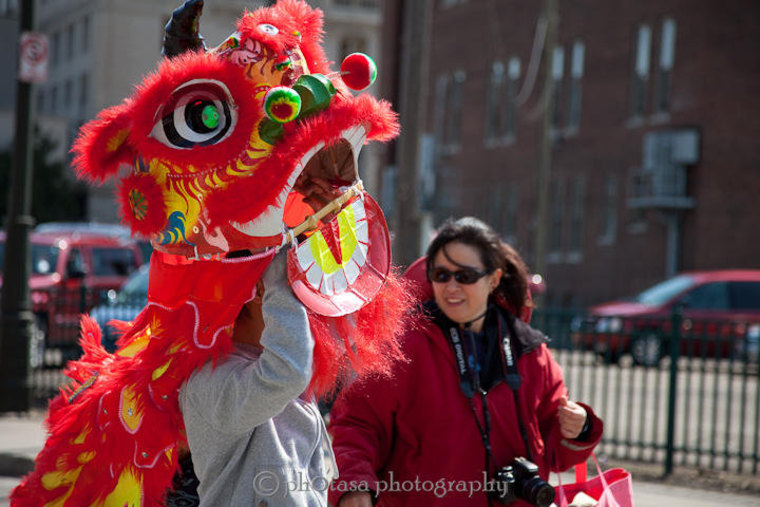
Chinese New Year celebrations are all about new beginnings and fresh starts. The new year is a time of hope and good luck.
How one spends the first day of the new year is supposed to foretell how the rest of the year will go. On Lunar New Year’s Day — this past Saturday — parents are not supposed to scold their children, brothers and sisters are not supposed to argue, and (pro tip) no one is supposed to cook or you will end up scolding, arguing, or cooking all year.
Some say that the first person to come visit your house on Lunar New Year’s Day will foretell what the new year will bring. Instead of leaving it up to chance, some people actually arrange for a rich person to come to their door first thing to ensure that their new year will be full of riches.
I am not really that superstitious, so, although I teach my children these old Chinese traditions , I am OK with occasionally nodding toward the spirit of the idea even if we do not get the letter of it exactly right.
RELATED: 10 Lunar New Year Facts to Help Answer Your Pressing Questions
Celebrated jazz pianist and composer Jon Jang is coming to town for a big concert next week. I plot — if the university has not already made plans for him — that maybe I can invite him to our house for dinner, ensuring that our new year will be filled with music, arts, and activism. Maybe I am superstitious enough to believe that this will be one small act of supernatural resistance against reportedly proposed funding cuts to the National Endowment for the Arts and the National Endowment for the Humanities .
"All I want is quiet. But if the news of the past week is any indication, this is not going to be a quiet year."
But our weekend is full of soccer, academic games, Chinese school, and Chinese traditional orchestra rehearsal. Scheduling is going to be tricky. I am invited to a professor’s Lunar New Year party at which Jang will be a guest. Close enough!
Music, arts, and activism may not come to our house directly, but we will be spending the year with them.
Before Lunar New Year’s Day arrives, one is supposed to settle all debts, resolve all fights, clean the house top to bottom, and wrap up the old year so that the new year can begin fresh.
Instead, I usually end up treating the Lunar New Year as an extension, an extra month or two to finish up the old calendar year before I have to start thinking about the new.
On Jan. 1 when people ask, “What are your New Year’s resolutions?” I answer, “Oh, I’m Chinese American, I still have another month.”
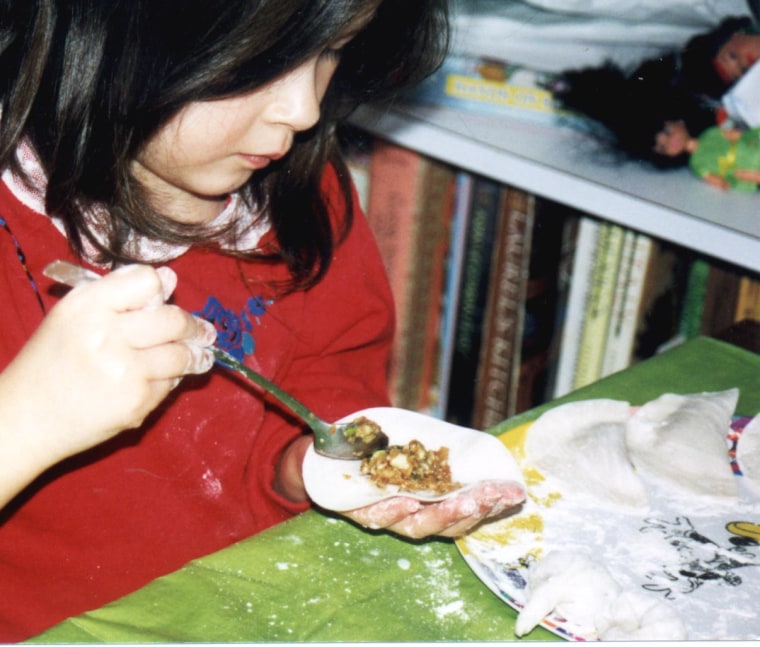
However, this past year, I have been feeling so overextended that I have been actively trying to pare down my commitments so that I am not obligated to too many others. During the two weeks of winter break that my children were out of school, I did not leave the house. I just sat in my kitchen, and I worked. Somehow, miraculously, I finished all of my 2016 commitments by Jan. 7, 2017, a first ever for me. I remember spending all of Jan. 8 in a daze. I had new stuff I could do, but there were no emergencies, no fires to put out. Then school started again on Jan. 9 and we were back to frantic freneticism.
RELATED: New Book on Civil Rights Icon Fred Korematsu Challenges Youth to Speak Up for Justice
All I want is quiet.
But if the news of the past week is any indication, this is not going to be a quiet year.
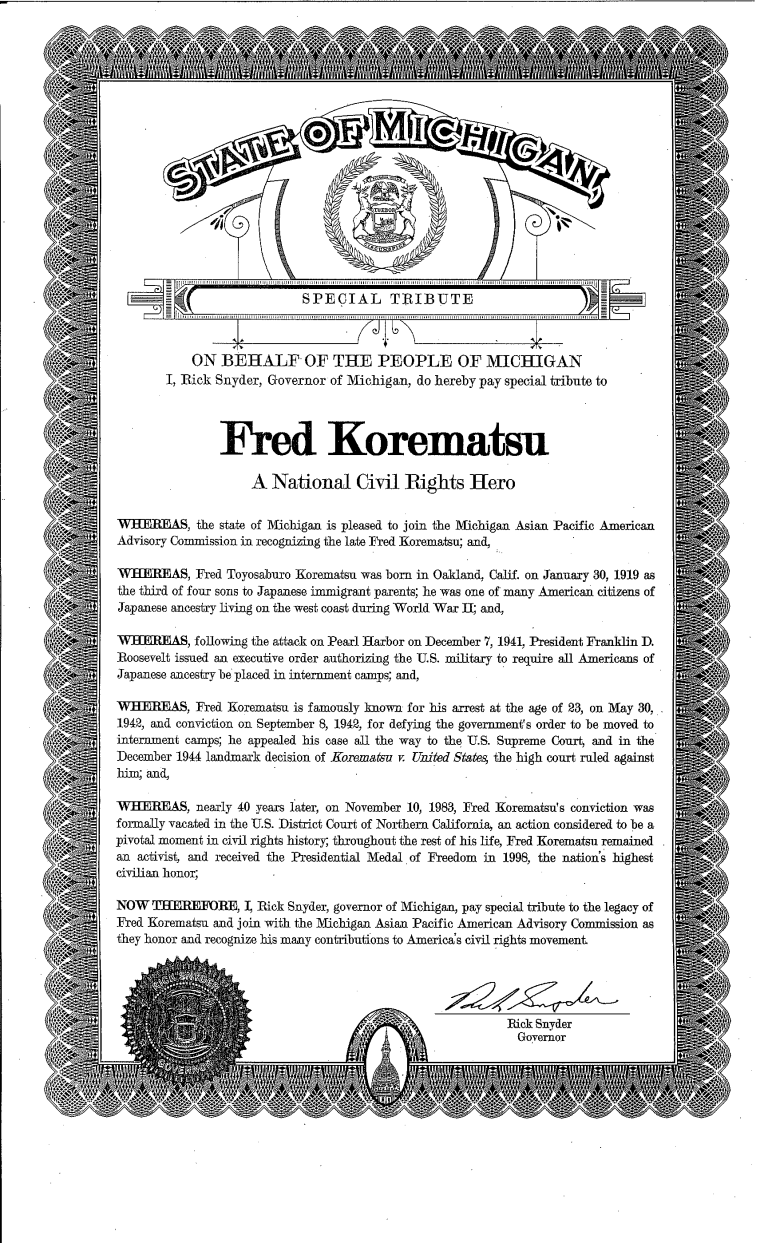
Monday, Jan. 30, is recognized by several states as the Fred Korematsu Day of Civil Liberties and the Constitution . Korematsu challenged the constitutionality of the incarceration of Japanese Americans during World War II, which helped pave the way for redress and reparations for the Japanese-American community in the 1980s.
Although Korematsu received the Presidential Medal of Freedom, he was also a somewhat reluctant activist. He was only 23 years old at the time and just wanted to hang out with his European-American girlfriend. Yet, once he started fighting, he wanted to make sure that the same thing could never happen to anyone again. He spent the last years of his life standing up for the Muslim-American community after the events of Sept. 11, 2001.
This year will be the 135th anniversary of the Chinese Exclusion Act , which banned Chinese from entering America from 1882 to 1943. It is also the 75th anniversary of Executive Order 9066 , which incarcerated about 120,000 Japanese Americans, two-thirds of whom were American citizens, in incarceration camps during World War II. It is also the 35th anniversary of the baseball bat beating death of Chinese American Vincent Chin by auto workers who blamed the Japanese for the troubles of the automotive industry. These events are all connected.

On Holocaust Remembrance Day, President Trump signed an executive order to ban people from several Muslim-majority countries and to halt the entry of refugees . Refugees, international students, and U.S. permanent residents — who had visas and were already in the air when the order was signed — were not allowed entry upon arrival at the airport, followed by a weekend of mass protests at airports around the country and an emergency stay of the order.
“Don’t be afraid to speak up,” Korematsu had said. “One person can make a difference, even if it takes 40 years.”
So on Monday, I will be at the law school’s Korematsu Day program — with members of the Japanese American Citizens League, American Citizens for Justice, and the Arab Community Center for Economic and Social Services (ACCESS) — speaking up about this history and the importance of standing up for others, especially today.
I will be thinking about all the ways that I am privileged to speak, and I will be carrying with me the thousands of people who have been standing up, marching, and protesting for others; the dark humor and new-found resistance of historians, scientists, and park rangers; the courage of Native Americans and veterans protecting the environment at Standing Rock; the image of volunteer attorneys sitting and working on the floors of airports; and the conviction of the New York Taxi Workers Alliance who went on strike at JFK Airport Saturday in protest of the executive order.

Chinese New Year is a boisterous, magical time, with firecrackers and lion dances to scare away bad luck and evil spirits and to set the tone for the new year. Chinese New Year traditions are not about waiting and hoping for good luck to arrive, but about taking steps to make sure that it happens.
So make noise. Be brave. Create your own luck to shape this new year.
Follow NBC Asian America on Facebook , Twitter , Instagram and Tumblr .
- Essay: Looking to Martin Luther King Jr. Day to Light the Way Forward
- Essay: Celebrating Chinese New Year Far From Home and Family
- Essay: In the 'Las Vegas of Asia,' Lessons in How Multiculturalism Makes Community
- Essay: The Day after Election Day, What Do I Tell My Son?
Frances Kai-Hwa Wang is a freelance writer and speaker based in Michigan and Hawaii. She has been a contributor for AAPIVoices.com, NewAmericaMedia.org, ChicagoIsTheWorld.org, PacificCitizen.org and InCultureParent.com. She teaches Asian Pacific American Studies and writing and she speaks nationally on Asian Pacific American issues.
Home — Essay Samples — Life — Holidays — Chinese New Year
Essays on Chinese New Year
How the chinese new year began, celebration of chinese new year in asian countries, the chinese new year ’s eve in my family, made-to-order essay as fast as you need it.
Each essay is customized to cater to your unique preferences
+ experts online
The Chinese New Year and The Effects of Changing Cultures
Relevant topics.
- Winter Break
- Thanksgiving
- Cinco De Mayo
- Veterans Day
- Mothers Day
- Spring Break
- Day of The Dead
By clicking “Check Writers’ Offers”, you agree to our terms of service and privacy policy . We’ll occasionally send you promo and account related email
No need to pay just yet!
We use cookies to personalyze your web-site experience. By continuing we’ll assume you board with our cookie policy .
- Instructions Followed To The Letter
- Deadlines Met At Every Stage
- Unique And Plagiarism Free
- Entertainment
- Environment
- Information Science and Technology
- Social Issues
Home Essay Samples Life
Essay Samples on Chinese New Year
Chinese new year celebration: lion dance performances.
Chinese nuances are still felt today. By the way, do you know that one show is always enlivening the Lunar New Year? The answer is lion dance. Yup! The cheap entertainment that emerged and became one of the traditional Chinese arts is indeed enough to...
- Chinese Culture
- Chinese New Year
The Request for Approval on the Chinese New Year
When one mentions Chinese New Year (CNY), it is hard for one to not think of the joy from the numerous Ang Baos received from relatives during house-visiting sessions. Yet, such happiness comes together with the incessant questions, especially about marriage, from our aunts and...
The Peak of Chinese Culture in the Chinese New Year
This research paper aims to compare the Chinese culture with Europe. Especially in terms of business, providing some examples of traditional Chinese norms when you are going to negotiate with a Chinese company that is important to take into account. To continue, with the help...
The Favorite Festival of Everyone, Chinese New Year
If you ask me what is my most favorite festival, of course, it would be the Chinese New Year, or Spring Festival, which was the most important festival in China that symbolized the beginning of another brand new year. At this time of the year,...
Best topics on Chinese New Year
1. Chinese New Year Celebration: Lion Dance Performances
2. The Request for Approval on the Chinese New Year
3. The Peak of Chinese Culture in the Chinese New Year
4. The Favorite Festival of Everyone, Chinese New Year
Stressed out with your paper?
Consider using writing assistance:
- 100% unique papers
- 3 hrs deadline option
- Career Goals
- Personal Experience
- Perseverance
- Personality
Need writing help?
You can always rely on us no matter what type of paper you need
*No hidden charges
100% Unique Essays
Absolutely Confidential
Money Back Guarantee
By clicking “Send Essay”, you agree to our Terms of service and Privacy statement. We will occasionally send you account related emails
You can also get a UNIQUE essay on this or any other topic
Thank you! We’ll contact you as soon as possible.
Home / Essay Samples / Culture / Chinese New Year / The Positive and Negative Effects of the Chinese New Year
The Positive and Negative Effects of the Chinese New Year
- Category: Culture
- Topic: Chinese Culture , Chinese New Year
Pages: 2 (1000 words)
- Downloads: -->
--> ⚠️ Remember: This essay was written and uploaded by an--> click here.
Found a great essay sample but want a unique one?
are ready to help you with your essay
You won’t be charged yet!
Day of The Dead Essays
Birthday Essays
Pop Culture Essays
Subculture Essays
Multiculturalism Essays
Related Essays
We are glad that you like it, but you cannot copy from our website. Just insert your email and this sample will be sent to you.
By clicking “Send”, you agree to our Terms of service and Privacy statement . We will occasionally send you account related emails.
Your essay sample has been sent.
In fact, there is a way to get an original essay! Turn to our writers and order a plagiarism-free paper.
samplius.com uses cookies to offer you the best service possible.By continuing we’ll assume you board with our cookie policy .--> -->